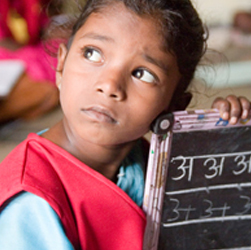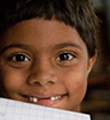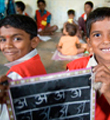

A few years after starting Swadhar’s work in Pune, Meenakshitai realized that working for women alone is only half the work done. That working towards making women self-reliant and empowered, works hand-in-hand with an assurance that their children would have more promising futures. She therefore decided to extend Swadhar’s work for underprivileged children too. It started with a project called ‘the Alternate School Project’ in 1998, in Bibwewadi. This project was initially supported by the Dorabjee Tata Trust and UNICEF. Later in 2003, this work was replicated in Pimpri Chinchwad Municipal Corporation area too.
Akshardeep aims at providing access to school to
underprivileged children who either drop out or cannot go to
school because of
i) distance from the schools,
ii) migration of parents,
iii) have to take care of
younger siblings, or
iv) have non-conducive
surroundings/homes for studying.
This is a holistic program and involves multiple initiatives aimed at children from 0-14 years of age, as well as their families.
This initiative was developed for expecting mothers, caregivers and their community. It aims at promoting holistic development - physical, cognitive, social, and emotional - in children between 0-3 years of age who are born and raised in the urban slums. Swadhar’s facilitators regularly conduct group sessions at our resource centers where groups of four or five mothers, fathers, adolescent girls and grandparents are brought together and made to understand various topics and stages about a child’s development. Community awareness about early childhood is raised through “Baal melas”. Home visits are conducted where necessary. Numerous attractive and user friendly tools are used to convey these concepts. Demonstrations are given, for them to create developmentally appropriate play activities for their babies. Mothers are made to understand the simple yet important things about early childcare, their nutrition, etc.
This initiative is meant for children in the age group of 3-6 years. While it is widely known that pre-schooling decreases the chances of children dropping out of school, the RTE Act (2010) does not cover children in the age group of 0-3 and 3-6 years. These early years are very important for a child’s overall development as the early education not only enhances the child’s development but also ensures the child’s retention in the formal education system.
This initiative has been developed for children who are admitted to regular schools by Swadhar. Children many a times find it difficult to cope with language and Math. In most cases they land up failing in these subjects, eventually dropping out of school. They are given special guidance and help in these subjects by the trainers at Swadhar, in order to help them retain in schools.
This Initiative focuses on children who have the wish and will to study, but do not have easy access to education. These children are in circumstances where they cannot be admitted to regular schools. These bridge classes are conducted for them at suitable times and locations. These children are taught in a fun way using the project method of teaching, thereby motivating them to continue their education. There are special formats for baseline evaluation, gauging their progress during the year and assessments at year end. There are teaching materials and tools, quite well defined for each level of teaching and make it easy for teachers to implement this initiative.
This initiative aims at creating a child friendly center for education through multimedia and play methods. At the resource center children are given an opportunity to play with educational toys and material which help to stimulate their large and finer motor skills, language, math and general knowledge; to do art and craft activities that help in developing their artistic potential; to learn through the medium of music; and to learn through informative and entertaining audio-visuals. Children are also given a nutritious meal at the center.
With a growing demand for Abyasikas, Swadhar decided to start a Community Library which would be accessible to children, adolescents and adults in the community in order to help inculcating a reading habit among people. The Community Library functions like any other library where books are lent to members. It also provides an additional opportunity and support for learning and education of children and provides adults in the community with better opportunities of accessing information that is crucial to their empowerment.
This initiative is meant to provide suitable place to study for children in middle and upper grades at school. Children from slums, who desire to study, need a clean, quiet and suitable place to study. Abhyasikas in the slums were thus initiated Bibwewadi for children from Grades 5 to 10. At the Study Center, children have access to textbooks and other self-study material along with on-the-spot guidance from a teacher. These centers are open for 4 hours in the day – 2 hours in the mornings and 2 hours in the evenings They operate as support classes where need-based counseling and continuous guidance are provided. This has enabled Swadhar to build rapport with people in the community. The overall strength of the educational program in the community has also enhanced. Swadhar is hence keen to start more Abhyasikas at different locations in Pune to provide support to the growing numbers of children who desire to study and pursue higher education.
Akshardeep has also reached out to three nomadic communities –Camel riders, Statue makers, fortune tellers-who have been living on the outskirts of Pune city for many years.They are ‘faceless’ as they have no records like ration card or voter cards to prove their existence. They do not get the benefit of any government schemes and they are not aware of them. Their life is therefore unsettled.In all the three communities we conduct educational support classes for children of age group 3-14 years, early childhood awareness sessions and classes for adolescents girls
Palak Sabhas are held to raise awareness among parents about the importance of education and also to encourage their participation.
E learning Facility at two locations provides curriculum based education support to children of age group 8 to 14 years.
Right to education: Awareness generation activities regarding Right to education Act are conducted at community level.
Aakash and his younger brother were born to HIV positive parents. He learnt of his own condition and his family’s
I have been giving donation to ‘Akshaedeep’ project under “Swadhar’ for the last 5-6 years Vidyanand M.Ranade, Govt. of Maharashtra


